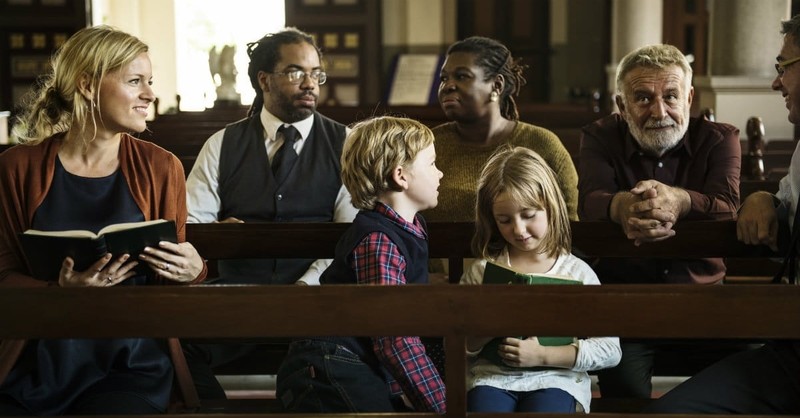
When I was sixteen years old, I struggled with depression. However, when I accepted the Lord at age eighteen, that depression was lifted from me. Although that was my reality (and one of which I am grateful for) it is not the reality for everyone. This is especially difficult for the believer. There seems to be a general stigma with church attenders and those struggling with mental illness. Because the church feels ill-equipped to deal with this growing epidemic, attenders often throw around clichés and platitudes like “just believe and pray more and things will get better” or “if you just increase your faith, God will remove it for you.” Yet these attitudes make us look more like the friends of Job rather than followers of Christ. I put this question out to friends on social media, and these are some of their responses when asked what makes church hard for you when you are struggling with depression.
Photo Credit: Pexels

1. A decreased interest in being in community
One of the important aspects of a vibrant relationship with the Lord is doing life together with others in community. When you are depressed, however, you often have a decreased interest in social activities. This can prevent you from having a deep connection associated with being in community with others. We need others to help us walk together in our Christian walk. But if you are opting to stay home and watch TV rather than develop meaningful relationships, this will make meandering through your Christian walk more difficult.
Photo credit: ©Thinkstock

2. Physical pain that prevents them from regular attendance
Depression can manifest in many symptoms, less common of which is physical aches and pains. If you are living with chronic pain, it may be difficult to get out of bed to attend church. While watching church services on TV may feed your mind, it won’t feed your soul in the way regular church attendance with face-to-face relationships would.
Photo credit: ©Thinkstock

3. A feeling of separation from God
Many responders said they felt it was a spiritual battle between their hearts and their heads. Their heads believed God loved them, but their hearts and emotions felt otherwise, causing a feeling of separation from a God who longs to be close to them. When it would be most beneficial to attend church more, responders said they actually chose to isolate themselves from a Christian community whom they believed didn’t understand them.
Photo credit: Unsplash

4. A sudden burst of sadness makes a scene during worship
Depression can cause intense and unpredictable mood changes, swinging the emotional pendulum between happiness and sadness rather quickly. This is difficult enough to control in day-to-day life. But when you are immersed in worship and a sudden burst of sadness overcomes you (as can happen when the Holy spirit comes upon you), it can cause a burst of uncontrollable crying, causing the person additional embarrassment.
Photo credit: ©Thinkstock

5. Trouble sleeping makes it hard to focus during after-church activities
A common misconception is that those with depression sleep all day. Although this may be true for some, others find themselves lying awake at night, making it increasingly difficult to get up in the morning to go to church. Medications mess with sleep patterns, further complicating the problem.
Photo credit: Unsplash

6. Increased anxiety in social situations
Ironically, anxiety and depression go hand-in-hand. While some may not feel “down” all the time, the emotional pendulum might swing between bouts of depression and extreme anxiety in a relatively quick span of time. This may cause sufferers to greatly fear social situations with fellow church members. Some days, the greatest accomplishment for those plagued with depression or anxiety is to simply get out and socialize with those around them.
Photo credit: ©Thinkstock

7. A lack of understanding about mental illness
“It’s all in your head,” and “Taking medication means you lack faith” were just some of the comments those ignorant about the illness had for the depressed when they found out he/she took medication to help them cope. While I do think believers more quickly run to the medicine cabinet before running to their elders, some diseases need other resources to give relief. We need to understand that it’s difficult enough to take medication, let alone admit this to those closest to them. The more open we are to allowing God to use whatever means necessary to promote healing, the quicker those who fear entering the church doors may decide to put one foot in front of the other and walk into their church’s entryway once again.
Photo credit: ©Thinkstock

8. A difficulty sharing feelings openly with others for fear of judgement
So often when we enter church, many fellow churchgoers ask how we are doing; but instead of giving an honest answer, we settle for a simple reply of “I’m fine.” Although five minutes before worship begins may not be ample time to launch into all you are struggling with, choose to take time to find one person whom you trust and can confide in. This may reduce symptoms significantly.
Photo credit: Pexels

9. A fear of not measuring up against the Sunday mask
Many responders said they feel like they have to defend their worth and put on a mask, much like their other brothers and sisters in Christ. Most said they would love to be a part of a body that valued authenticity over perfection. In a church culture where looking perfect is valued above being real, the depressed feel that they are at a grave disadvantage because they can’t get it all together. They try to measure up, but often feel they fall short.
Photo credit: ©Thinkstock

10. A strong urge to keep silent
For many, keeping silent was a better alternative than admitting they had the illness in the first place. The lack of a healthy self –concept compels churchgoers to suffer in silence in an attempt to pretend the illness doesn’t exist, or that they in particular don’t struggle with it. If the enemy could keep Adam silent as he stood next to Eve while she took that life altering first bite of the apple, can’t he keep silent those that are battling him in an effort to give glory to himself rather than to God?
Photo credit: Pexels

So, what can the church do about this?
As I empathized with the many people who are suffering in the pew, I felt it necessary to offer some strategies that the church can implement to help so many of those who long to be a part of their local church, but can’t muster up the strength or courage to do so.
Photo credit: ©Thinkstock

Reverse the stigma
As a church, we need to stop believing the lie that prayer and Bible reading are the only two necessary remedies to this increasing epidemic. Although God can do the miraculous and instantaneously heal those who ask, sometimes that is not His will. God’s will is for all to be healed, but not all will be healed in this life. We live in a broken world. God uses many sources to achieve healing, including medication and the help of trained professionals. No matter how much we pray, sometimes healing with outside sources like medication is the solution.
Photo credit: ©Thinkstock

Open Up
Out of all the answers I received to my question, nothing was more was eye-opening than the sheer volume of those quick to respond. We need to be more aware of this growing problem. Although we may not have a specific solution to help those in need, we do have one thing that would benefit all those suffering: a listening ear. Sometimes the best thing we can offer are closed lips and open ears. That may be the best example of Jesus we can give to those inhabiting the pew next to us.
Photo credit: ©Thinkstock

Recognize the Battle
While there may be a grain of truth that “it’s all in your head,” the reality is that there are spiritual battles going on in heaven right now that we are not aware. Some of those battles take place in our minds and hearts. The best way to not give Satan grounds to continue to plague us is to take away his power. Adam could have refuted the seeds of doubt that Satan planted in Eve’s mind by simply stating the truth. The Bible is full of the truth about the Savior who claimed He was the Truth. Memorize and meditate on His word. Fill your mind with the words from those who knew Jesus best. This will help refute the lies that you are less than worthy because of the mental battle you are facing.
Photo credit: ©Thinkstock

Hire a professional
Many churches would benefit by referring or enlisting the services of professional counselors that specialize in depression and anxiety. Knowing there is someone available to talk to those suffering may help protect people’s privacy and provide a safe space to talk about their struggles. This may also provide an additional aid with the financial issue as many insurances don’t cover counseling as a covered service. If the church is using budgeted funds to pay a professional, it could be providing a life saving service to those in need.
Photo credit: ©Thinkstock

Offer to meet one-on-one
since most don’t make it to church because of physical pain or fear of lack of interest, do what you can to meet with them one-on-one. This will meet the continued need for fellowship and also show the person who is struggling that you really care about them and want to invest in their wellbeing.
Photo credit: ©Thinkstock

Don't Give Up
Just because someone says they don’t want to socialize now doesn ‘t mean they won’t ever. Continue to pray and ask God to reveal when it is best to offer a listening ear or advice, even if the depressed person has refused previously. They may not express it; but knowing you care means a great deal to them, and is a reflection of the Jesus from which they currently feel isolated.
Although the church may not have the ultimate solution to nip this increasing epidemic in the bud, it does need to offer whatever solutions it can to help the hurting. Sometimes a listening ear is all that is needed. But for those who need additional help, sometimes a professional is necessary. When churches use their resources to help the hurting, we all win, because Satan is defeated and His children are empowered to do what they are called to do—bring the gospel to the lost.
Michelle S. Lazurek is an award-winning author, speaker, pastor's wife and mother. Winner of the Golden Scroll Children's Book of the Year, the Enduring Light Silver Medal and the Maxwell Award, she is a member of the Christian Author's Network and the Advanced Writers and Speakers Association. She is also an associate literary agent with Wordwise Media Services. For more information, please visit her website at michellelazurek.com.
Photo credit: Unsplash
Originally published Wednesday, 24 October 2018.



